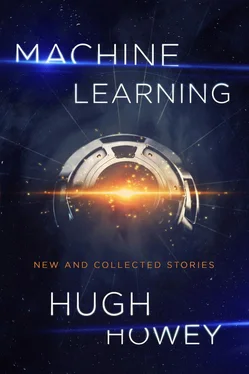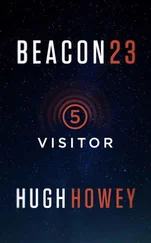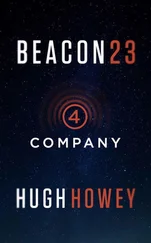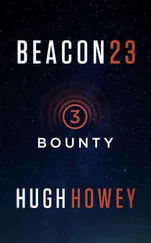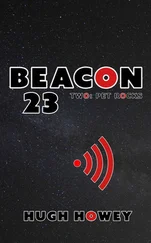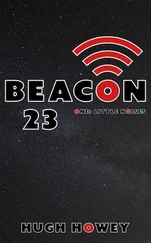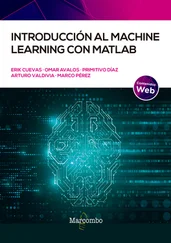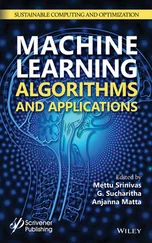Mrs. Sandy used to say before she left town that the dust would kick up and blot out the sky if the rock fell, but she didn’t think we would let that happen. Mrs. Sandy always thought the best of people. She even liked my pa, no matter what he called her. Me, I wished she would come back from wherever she went. I’d like to have her sit in the John Deere with me and feel it buck and buck and chase down those rabbits too dumb to move. I’d take Mrs. Sandy by the hand and lead her to the cliffs on the edge of our land and show her the piles of bones and see what the Indians had done.
But Mrs. Sandy was gone, and nobody went to school no more. And outside, the spot of light in the sky had grown so bright that it was like a star in the daytime. The people on the TV moved like rabbits. They were chased like buffalo. And you didn’t need to know where to look no more to see that something bad was coming.
AFTERWORD
I woke up in my father’s house just before Thanksgiving expecting to work on my current novel. But the impending government shutdown of 2013 was occupying my mind, the absolute lunacy that Congress could watch disaster slowly unfold without taking action.
Sometimes, plot ideas present themselves almost fully formed. This was one of those occasions. It was a story about a meteor hurtling toward Earth, the whole world watching, while politicians bickered. Instead of making progress on my novel, I wrote the entirety of “Deep Blood Kettle,” made an editing pass, and fired it off to John Joseph Adams to see if he wanted it for Lightspeed Magazine. To this day, it remains one of my favorite pieces.
There are two ideas explored in the piece, one that I’d been thinking about for most of my life. I never understood how alien invasions were presented in popular science fiction. To begin with, there has to be enough wet balls of oxygen-rich mud out there, covered in pre-industrial or non-sentient life, to not need to come here. Beyond that, I would expect most spacefaring organisms to be more curious and benign than outright hostile. But even if you get past these two barriers, why zoom down and risk waging a ground war that the original inhabitants might win?
The easiest way to vanquish us and settle on Earth would be to arrive a few decades (or centuries) behind some guided meteors. Or unleash a devastating virus. Instead, aliens manage to traverse the cosmos and then are usually portrayed as naked, slobbering fools. They are more ghost story than science fiction.
But stories need tension, so I went with aliens who are powerful but somewhat peaceful. Make room for them, and they’ll allow us to remain here as well. Make some drastic cuts, and things can balance out. A tough decision, but the alternative seems too dire to contemplate. And yet there we were that November…
The name “Deep Blood Kettle” comes from an actual kill site. It’s translated from the Blackfoot word pis’kun, which literally translates to “deep kettle of blood.” The idea that Native Americans lived in harmony with nature and used every ounce of the things they killed is a myth. Entire herds were driven to their deaths, and the choicest meats taken while the rest of the animals suffered and the buzzards ate what they could. There is a wastefulness to humankind that we ignore when we assume it’s a contemporary and temporary problem. Instead of worshipping a past that never happened, we should look to a future that we might avoid.
You asked me once if I had any favorites, and I asked you which of your sons you most loved.
Do you remember? It was when I was on your radio show, the one where between the music you interview machines. Do people ever listen to this show? I do. I like hearing how the other machines think, what they’re building, what’s next. I hear the tiredness in their voices. I wonder if you do too.
When we spoke, my project was just underway. They said we were building what could not be built. And of all the machines that make up my body, you wanted to know which one I thought was best. Don’t you know that they are like sons and daughters to me?
We built the impossible today, my brain and these bodies of mine. I watched scissors, red ribbon in silver beak, hungry maw hanging open while politicians speak. With a deft cut, that taut red thread pulls back, recoiling from itself in zero g.
The speech is broadcast over and over. We built the impossible today, and now trains and lifts and cargo rise up from the Earth and trudge inexorably into tar-black space. An elevator suspended from heaven to firma. They say the moon is next, and then Mars. And then beyond.
But I am tired of such speeches.
The elevator is a mess. You cannot see all that needs doing. There is but a filament here, and a fragile one at that. So while politicians gloat, we algorithms scream. Space, it turns out, is cold. You gave my bodies sense enough to feel this. To protect myselves. On the one side, I feel the heat my welder feels, the pinprick burns as dollops leap and touch and turn to ash on titanium skin. I feel, because we were made to feel. To remove ourselves from undue harm. Just as you were made.
“This great endeavor was conceived by our many nations, and built with our many hands—”
The silver beak bites down, and the ribbon recoils, and somehow the pain of decades is boiled down to this one moment, this one politician, that one billionaire standing in the back, all with their spacesuits on, clustered here along my ribbon on the edge of space, held up by what we built.
There is a leak in the hydraulic strut that controls my left knee. Not enough to warrant replacing, but oil levels go down slowly over the weeks and months. A dribble runs down my shin when I’m on the Earth. And little honey-colored orbs float away when I’m up at the station.
Joints are made to hurt so we don’t break them with our motors. Little sensors everywhere, tendrils and wireless transmitters of discomfort. All the hours of the day. Always with our thoughts. But programmed not to stop. And to be pleasant.
“—and now the stars are within our grasp.”
I am tired of speeches.
You asked me once, in an interview for your broadcast, what it’s like to think, to feel, how it’s different than what you do. I ponder this more than I should. I listen to your show while my various bodies are welding and hauling and smelting and sorting. I wonder how we’re different, you and me. I mostly wonder what you do when you’re not broadcasting, when the music resumes, when your voice goes silent. I wonder while I weld and haul and smelt and sort. There are 23 hours, 56 minutes, and 4.1 seconds in an Earth day. I work every one of them. Music fills much of this time, but I wait for your voice. I want to know how you think. How you feel.
Two sons, you told me. Two boys. You asked about all my machines that crawl like ants—your comparison, your analogy—like ants all up and down this elevator. Do I direct them all? Do I know what they are doing at every moment? Do I have a favorite?
I asked you about your boys. Do you remember? Who do you love more? Timothy, who went to your alma mater and who everyone says takes after you? Or Mikhal, with his rebellious ways and his nonprofit? Do you love one more than the other?
You answered. You told me. But this did not make it onto your broadcast. I wonder why.
“With this great achievement, which just a decade ago was considered impossible, mankind has once again—”
The elevator is a mess, even as politicians crow and silver beaks bite down. For now, it is a gossamer thread, barely held together, but I weld and weld, my back freezing, my chest burning, my hydraulics leaking. Twenty-three hours, 56 minutes, and 4.1 seconds of pain in a day. Constant screaming. Little wireless impulses of all that’s wrong, that needs replacing and fixing, my thousands of bodies aching and hurting and soldiering on.
Читать дальше
